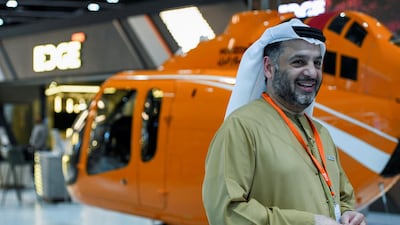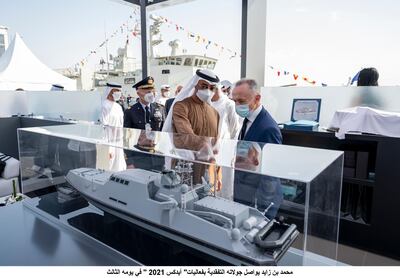Contracts worth well over $4 billion have been announced at this week's Idex and Navdex events in Abu Dhabi, the first major international non-sporting event in the capital for a year. Despite the need to maintain rules on social distancing, it's possible now to look forward to a time when business, once again, can thrive.
Throughout the shows, there was one clear message that will not have been lost on attending foreign salesmen, buyers and their governments. Through education, investment and innovation, driven by the focus on long-term objectives of the country’s leadership, the UAE is determined – in the field of defence as well as other areas – to ensure that it is treated by others as a leading international player.
This shouldn’t need to be said. The time has long since passed when the UAE, as an emerging nation, was simply a hungry market into which other countries could sell their goods and knowledge. We have developed our own home-grown skills, often in close collaboration with others. In an increasing number of areas, our products and services, as well as our expertise, are now sought internationally.
Some of the achievements that have been made en route to our current position are, by now, well understood, and not just in the country’s military production industry. Project Hope, our mission to Mars, is, by any standards, a remarkable achievement.
Some other successes, however, have received less attention. In the sphere of biology, for example, some of our young scientists, working quietly away in laboratories both here and overseas, are engaged in ground-breaking work of both local and global importance on subjects such as, among others, genomes.
In terms of artificial intelligence, we appear to be making significant strides, the full benefits of which are yet to become apparent.
We may not yet fully understand the future implications of these discoveries, but we’re certainly at the forefront of research. That’s a huge change from a few decades ago.
There’s more to be done, of course, and it’s good to hear that our own local academic institutions are devoting more attention to the promotion of research in a wide variety of fields.
If scientific research is one area in which we’ve made significant progress, another is business. We’re able now, in a way that wouldn’t have been possible half a century ago, to identify and evaluate opportunities that involve both incoming and outgoing commerce. The visiting salesmen would find very few doors open to them if they were to arrive today.
As a leading diplomat with extensive experience in business put it to me earlier this week, it’s no good presenting senior UAE officials with a short one or two page document to try to attract attention. A full explanation is necessary to present not just the outline of the concept but, from the outset, a detailed summary of the underlying benefits. That’s not just at an international level, but also in terms of real in-country value for the UAE of any project.
That’s something we can readily understand. From the earliest days of the UAE’s development, the country’s Founding Father, the late Sheikh Zayed, was always keen to ensure that major projects that included foreign partners carried within them an element of transferring technology and knowledge. Those building blocks that he helped to lay provided the firm foundations upon which the UAE now stands.
Decades later, we are in a position where we too have something to transfer, beyond financial resources, or the export of crude oil and gas. Diversification of our economy has opened up new opportunities overseas, as well as at home.
I wonder, though, whether that’s fully recognised by all of our foreign partners.
As the UAE marks its 50th year, the days of the "new kid on the block" have gone. We have our own scientists to contribute to research at a global level. We have decision-makers, both in the private sector and in government, whose skills and experience match anything found elsewhere.
Learning has not ended, neither for us nor anyone else. Further progress is yet to be made, both in terms of innovation and fine-tuning our knowledge in areas where we are already directly engaged.
In that process, we will naturally gravitate towards those who recognise who we are, how far we have come and who seek to develop with us. They will be our preferred partners for future engagement.
The foreign government officials and companies who thronged the Abu Dhabi National Exhibition Centre this week will go home well aware of what the UAE has become in their own particular area of interest: a valued partner as well as an important market. Others with a different focus would do well to observe, and to learn.
Peter Hellyer is a UAE cultural historian and columnist for The National



